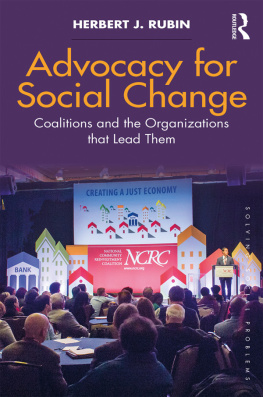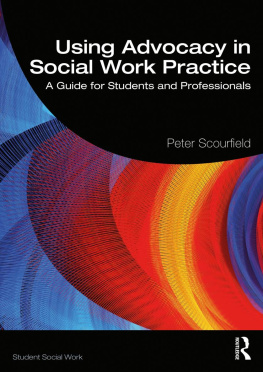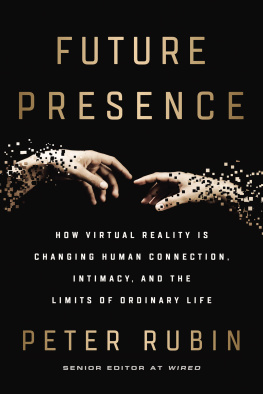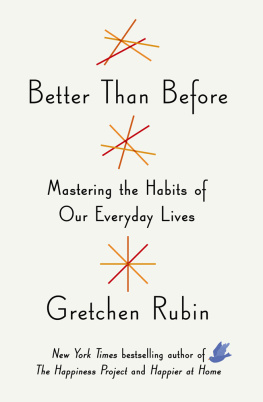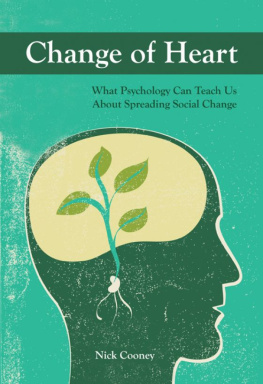p.i
Advocacy for Social Change
Herb Rubins Advocacy for Social Change sets a high bar for research on social change organizations. The identification and characterization of focal catalytic coalition organizations is a major contribution. The on-the-ground observation and the careful identification of successes and missteps make for valuable, excellent scholarship.
Dan Immergluck, Urban Studies Institute, Georgia State University, USA
This book portrays how small, geographically dispersed, and progressive social change and social service organizations working within a coalition can influence national-level social policies. Based on extensive empirical research on two national organizations and their local affiliates, one focusing on affordable housing and the other working to protect lower-income communities, this book shows the ways in which professionally staffed organizations that coordinate coalitions come about, and describes their work to mobilize coalition members to lobby and advocate, providing information, analysis and instruction to facilitate such action and, in so doing, becoming the public voice for the social change efforts of coalitions. Advocacy for Social Change details the characteristics of these organizations that the author has labeled as focal catalytic coalition organizations and then provides numerous examples of campaigns led by them on affordable housing and economic justice; campaigns that illustrate tactics that other social change organizations can emulate. As such, it will appeal to scholars of sociology with interests in social problems, social action, political sociology, urban studies, community development and organizing while extending the literature on interest group lobbying.
Herbert J. Rubin is a retired professor of sociology from Northern Illinois University. His interests are in urban studies, community organizing and research methods, with a focus on organizations working to help low-income individuals and improve the quality of life in neighborhoods of deprivation. He is author of Renewing Hope within Neighborhoods of Despair: The Community-Based Development Model and co-author of Community Organizing and Development.
p.ii
Solving Social Problems
Edited by Bonnie Berry
Director of the Social Problems Research Group, USA
Solving Social Problems provides a forum for the description and measurement of social problems, with a keen focus on the concrete remedies proposed for their solution. The series takes an international perspective, exploring social problems in various parts of the world, with the central concern being always their possible remedy. As such, work is welcomed on subjects as diverse as environmental damage, terrorism, economic disparities and economic devastation, poverty, inequalities, domestic assaults and sexual abuse, health care, natural disasters, labour inequality, animal abuse, crime, and mental illness and its treatment. In addition to recommending solutions to social problems, the books in this series are theoretically sophisticated, exploring previous discussions of the issues in question, examining other attempts to resolve them, and adopting and discussing methodologies that are commonly used to measure social problems. Proposed solutions may be framed as changes in policy, practice, or, more broadly, social change and social movement. Solutions may be reflective of ideology, but are always pragmatic and detailed, explaining the means by which the suggested solutions might be achieved.
Also in the series
Street Practice
Changing the Lens on Poverty and Public Assistance
Lori McNeil
Prison Violence
Causes, Consequences and Solutions
Kristine Levan
Social Problems and Inequality
Social Responsibility through Progressive Sociology
John Alessio
Teaching Justice
Solving Social Justice Problems through University Education
Kristi Holsinger
p.iii
Advocacy for Social Change
Coalitions and the Organizations
That Lead Them
Herbert J. Rubin
p.iv
First published 2018
by Routledge
2 Park Square, Milton Park, Abingdon, Oxon OX14 4RN
and by Routledge
711 Third Avenue, New York, NY 10017
Routledge is an imprint of the Taylor & Francis Group, an informa business
2018 Herbert J. Rubin
The right of Herbert J. Rubin to be identified as author of this work has been asserted by him in accordance with sections 77 and 78 of the Copyright, Designs and Patents Act 1988.
All rights reserved. No part of this book may be reprinted or reproduced or utilized in any form or by any electronic, mechanical, or other means, now known or hereafter invented, including photocopying and recording, or in any information storage or retrieval system, without permission in writing from the publishers.
Trademark notice: Product or corporate names may be trademarks or registered trademarks, and are used only for identification and explanation without intent to infringe.
British Library Cataloguing-in-Publication Data
A catalogue record for this book is available from the British Library
Library of Congress Cataloging-in-Publication Data
A catalog record has been requested for this book
ISBN: 978-1-138-56379-7 (hbk)
ISBN: 978-1-138-56381-0 (pbk)
ISBN: 978-1-315-12195-6 (ebk)
Typeset in Times New Roman
by Swales & Willis Ltd, Exeter, Devon, UK
p.v
With thanks for the work they have done in leading two exemplary coalitions this book is dedicated to Sheila M. Crowley and John Taylor
p.ix
Advocacy for Social Change: Coalitions and the Organizations That Lead Them demonstrates how progressive coalitions coordinated by organizations that I have labeled as focal catalytic coalition organizationsFCCOsundertake lobbying campaigns with both elected and regulatory officials. Based on extensive case studies of several Washington DC-based coalitions, this book provides a model of coalition action as well as detailed examples of the techniques of actions for social change that extend far beyond the immediate study, techniques that can be emulated by other activist organizations. The book is both a history of the battles for economic justice and affordable housing led by two exemplary organizations as well as guide for present-day actions for those seeking social change.
This study emerged slowly. It began in an effort to answer questions left hanging by previous research (Rubin 2000) about community development corporationsnon-profits that build affordable housing and seek to renew economically deprived communities: How were small non-profits able to gain the wherewithal to undertake complicated renewal efforts? The answer was that they were helped by national organizations formed to provide technical and financial support; a study of such organizations was needed. Such a broad study was impossible for a single researcher so I narrowed the research to concentrate on how the national (and some state) support organizations that coordinated coalitions sought to influence a variety of legislative and regulatory policies impacting poorer communities and low-income individuals.
I concentrated on half a dozen FCCOs involved in housing and community renewal, areas with which I was familiar, and then further limited the study to three national organizations: the National Community Reinvestment CoalitionNCRC; the National Low Income Housing CoalitionNLIHC; and the National Congress for Community Economic DevelopmentNCCED. The NCCED folded during the early stages of the study. I added three organizations from my home state of Illinois: the Chicago Rehab Network, Housing Action Illinois, and the Woodstock Institute, each associated with either NCRC or NLIHC.


